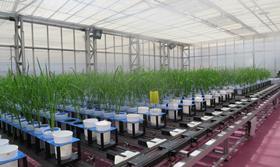
An international team of researchers has discovered a gene in rice that could potentially be transferred to other crops to help them grow in salty conditions.
Using the Plant Accelerator, a state-of-the-art facility in South Australia’s Adelaide, a team of researchers from Saudi Arabia’s King Abdullah University of Science and Technology monitored more than 500 genotypes of rice to find the gene that is most tolerant to salt.
The results of the study, which was done in collaboration with researchers from the University of Adelaide and the University of South Australia, could be used to help address issues of yield and stress resistance in plants.
“The Plant Accelerator allowed us to analyse numerous aspects of the growth of multiple plants simultaneously,” saidMark Tester, the project lead and supervisor to the study.“This is perhaps the most astonishing aspect of this work – we can now obtain genetic details daily, pinpointing exactly when each locus comes into play in response to salinity.'
“Having the Plant Accelerator means we don’t have to kill the plants, cut them off, put them on scales and weigh them, which is what traditionally you had to do,” Bettina Berger, scientific director at The Plant Accelerator, told the Lead.
“Providing high-quality research infrastructure, such as The Plant Accelerator, enables scientists in Australia and around the world to study novel aspects of crop tolerance to stress, which often require measurements over time instead of single time points.”



